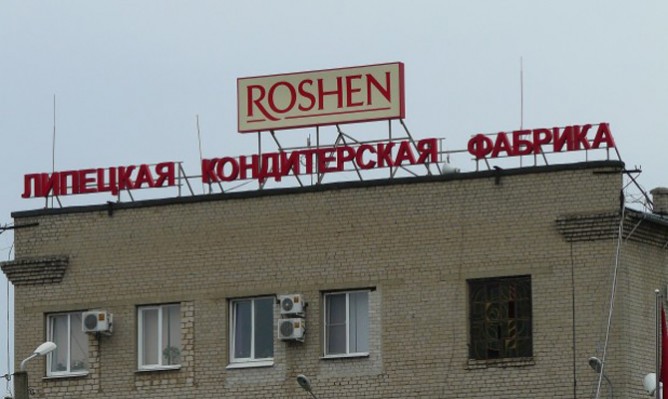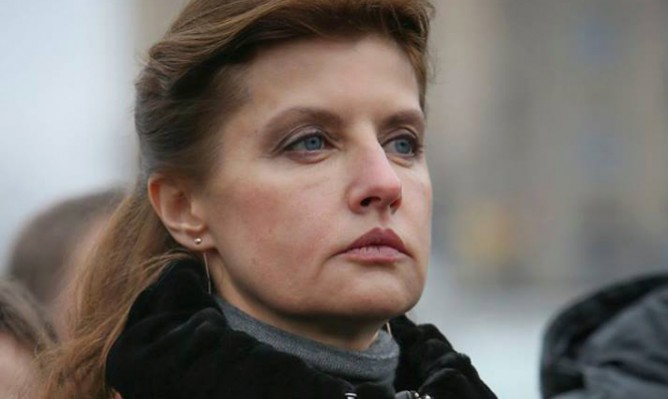Business
BusinessLipetsk Roshen – a tiny piece of Europe in Russian province

Roshen’s subsidiary in Lipetsk, owned by Ukrainian President Petro Poroshenko, has become a real stumbling block between the two countries, and almost a legend. Neither the Ukrainians, nor the Russians can understand how the Russian Roshen manages to operate in the current environment.
Capital tried to find out how the Russians work at the Ukrainian company, whom they support in the war in the Donbas, what they produce and what expectations they have for the future.
Miserable Swallow
“The factory in Lipetsk was commissioned in 1966,” said Oleg Kazakov, Deputy General Director of the Lipetsk Confectionery Factory Roshen. “However, it did not survive in the 1990s. Therefore, in 2001 it became part of Roshen,” he added.
The new owners started reconstruction and modernization of production right away.
The first production unit of Lipetsk Roshen was commissioned in 2002, and a bit later, the second production unit was opened in the village of Sentsovo, not far from Lipetsk.
“Currently we produce up to 500 tons of sweets a day in 15 production lines,” says Kozakov quite proudly.
In total, the Russian factory provided jobs to 1,500 Russians and has become one of the largest manufacturers of sweets in the region. Roshen’s share in the Russian market is 7%. Now the factory produces several kinds of caramels, butter scotch, jelly candies, toffees and biscuits.
Photo: Roshen.ru
When Ukrainian sweets were denied entry to Russia, the Roskomnadzor (Federal Service for Supervision of Communications, Information Technology and Mass Media) did not touch the Lipetsk sweets. Yet the company has enough problems of its own.
“This spring the factory already had to suspend its work. This was due to the arrest of our accounts by the Tverskoi District Court of Moscow within the framework of the criminal case brought by the United Confectioners Holding. They accused producers of using the names of the former Soviet brands. In particular, Roshen was accused of producing Lastochka-Pevunia (Swallow-Songstress) chocolates. The factory is no longer making the candy, but the problem remained,” said Kazakov.
Litigation between the United Confectioners and Roshen has started in 2010, and the amount of the claim has increased from 5 mn to 212 mn rubles. With its latest ruling of the court for intellectual property rights of the Russian Federation ordered to collect a compensation amounting to 79.85 mn rubles in favor of Tula confectionery factory Yasnaya Polyana.
Representatives of Lipetsk Roshen cannot say whether there will the 20th hearing – everything depends on lawyers, but people are definitely tired of courts.
“The most important thing is that the government has removed the attachment from our accounts. We have been planning to launch two new lines – for production of wafer rolls and fudge – for a while. However, because of the attachment of accounts we had to postpone the launch. Now we plan to launch the two new lines by the end of spring,” said Kazakov.
ATO vs. sweets
Lipetsk factory faced another urgent problem last summer. Ukrainian consumers started boycotting Russian goods and commodities in connection with the ATO in the southeastern Ukraine, while Russian consumers responded in kind. And Lipetsk Roshen was caught between two fires.
The decline in sales amounted to 20% because of the boycott of Lipetsk sweets in some regions of Russia, and the situation at the factory was quite threatening. In order to avoid the worst case scenario, the staff of the factory wrote an open letter to the people of Russia urging them not to boycott the company’s products because the management would have to shut down the enterprise, and it would be bad for everyone – for the budget, which receives taxes, and for the employees, who would lose their jobs, and for supplier companies.
Yet, last June representatives of the Liberal Democratic Party of Russia held a protest by the confectionery factory as a response to trashing of the building of the Russian Embassy in Ukraine. Several deputies of the State Duma appealed to the Investigative Committee of the Russian Federation and the Prosecutor General’s Office with a request to arrest Poroshenko’s assets in Russia.
“Commander-in-chief of the army, i.e. Ukrainian President Petro Poroshenko, should be responsible for the use of prohibited means and methods of warfare in the conflict in the Donbas,” claimed the deputies.
It is rumored in Lipetsk that the factory produces poisoned candy for Russian people, sponsors the war in the Donbas and much more.
The sword of Damocles is hanging over the factory permanently, and its staff is distressed – the country is in crisis, the products are sold poorly, and the factory is already downsizing.
Maryna Poroshenko, native of Lipetsk
People in Lipetsk are convinced that the Ukrainian chocolate concern would not open its branch in the city without intervention of the Governor of the Lipetsk oblast Oleg Korolev. Korolev has been leading the region since 1998. Poroshenko is one of his closest friends.
Maryna Poroshenko. Photo: Facebook
The governor, who knows the wife of the sitting Ukrainian president, does not deny their friendship, and says that Maryna Poroshenko was born in Lipetsk.
“Maryna Poroshenko is a beautiful woman, she was born here, in Lipetsk,” says Korolev. “Everyone knows it – she was born in Zhelyabova St. in our city” (video).
So, there is a chance that Poroshenko would keep his assets and the factory will work there. But there is another option – the Lipetsk factory will be acquired by Russian confectioners.
KDV Group, one the largest Russian manufacturers of snacks, already has eyes for the factory, according to Russian Forbes.
In the meantime, the factory survives as it can. “We had to shed 400 jobs,” says Kazakov. “Only 1,000 people remain employed. We hired people for high-volume production. Now we leave employees only for those volumes of sales, which we see today. Maybe, if we launch new lines in spring, we will hire some people back. Naturally, the preference will be given to those people who have already worked at the factory,” he said.
Kazakov prefers not to speculate on the prospects of sale, saying that the factory, in spite of the downsizing, will work as usual, reducing the load on the production capacities.
Almost Europe
Ordinary employees at the enterprise are reluctant to talk about the situation. It is possible to understand them – at Lipetsk Roshen, as well as at Roshen factories in Ukraine, employees are paid good wages, have decent benefit packages and bonuses.
The factory’s management warned its employees – no discussions of the political situation in production sites, no yellow-blue flags or St. George’s ribbons. It is also prohibited to take pictures.
“Average salary in Lipetsk is 10,000 – 15,000 rubles. Many people are paid up to 30,000 rubles at the factory, everything depends on the type of work. Employees also have bonuses, they can bring home candy or cookies from the factory, they have paid sick leaves… Last March things started to wind down – at first wages were cut, then was the downtime – every second day,” says Natalia Terekhova, an employee at the factory.
Whether the time has already passed, or the situation on the market came into play – because the Russian market is not diverse in terms of confectionery and sweets from Lipetsk Roshen are actually tasty and high-quality – but the situation is gradually leveling. Buyers return to Lipetsk Roshen. There is almost no downtime at this stage.
“I remember how everyone in Lipetsk was happy when this wreck of a factory was finally bought. The investor did not matter; it was important that the factory was working again – people found jobs, infrastructure was reviving. It is a pity that the situation has changed,” says Aleksei, an operator at the factory.
Every second employee of the factory has either relatives or friends, or acquaintances in Ukraine. Everyone has a different stand on the political situation, but all employees want the factory to stay and work in the same mode.
“A friend of mine, my former classmate, yells at me and insults me calling me a Mosckal,” says Terekhova. “And my cousin understands me, she did not support the Maidan. I, for one, help refugees as much as I can – there are many displaced persons in our region now… I tell everyone that I do not support Putin, I explain that Putin in Russia is like Yanukovych in Ukraine. Many people do not support his policies here, and even more people are apolitical. They just want to live, provide food for their families… Many people would like to have a job at Roshen. Where else can we find such kind of work here? Many people just pray that it all ends quickly, the conflict is over and there is peace, so that we would live like friends and neighbors again,” she says.
The company's management gathered its employees a few times, telling that the company did not sponsor the war – according to the documents, Ukrainian shareholders received no dividend payments. All profits were used for further development of production. The factory sponsored dozens of charity events in Russia. Its management asked that the employees made such information public – including putting a word out among their Ukrainian friends and relatives.
“Naturally, we agree with everything,” said Marina, another employee of the Lipetsk Roshen. “But many people do not believe that Poroshenko invested his money in the factory and receives no profit. Have you ever seen anything like this?” she added.
Many employees even support Poroshenko – but as an economic manager and no one supports the ATO there. In Lipetsk, there are too many residents of the Donbas and volunteers helping those who remained in the ATO area.
“Our factory is already a piece of Europe, in a manner of speaking. Everything is clean, neat, salaries are good, people have fixed working hours, and all conditions were created for the employees. What else does a man need? In the past Ukrainian colleagues said they had the same environment. Which means, that the factory’s owner managed to create a European company. I believe that he is able to do the same with the country, but who would let him?” said Marina.












 of the agreement of syndication with Financial Times Limited are strictly prohibited. Use of materials which refers to France-Presse, Reuters, Interfax-Ukraine, Ukrainian News, UNIAN agencies is strictly prohibited. Materials marked
of the agreement of syndication with Financial Times Limited are strictly prohibited. Use of materials which refers to France-Presse, Reuters, Interfax-Ukraine, Ukrainian News, UNIAN agencies is strictly prohibited. Materials marked  are published as advertisements.
are published as advertisements.